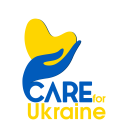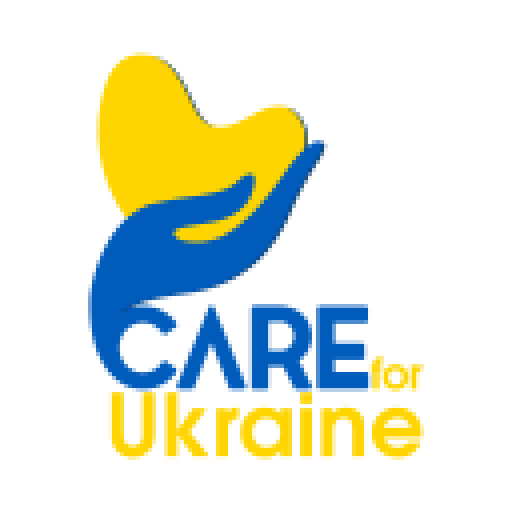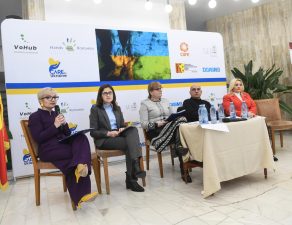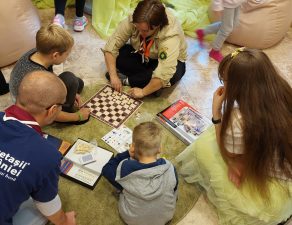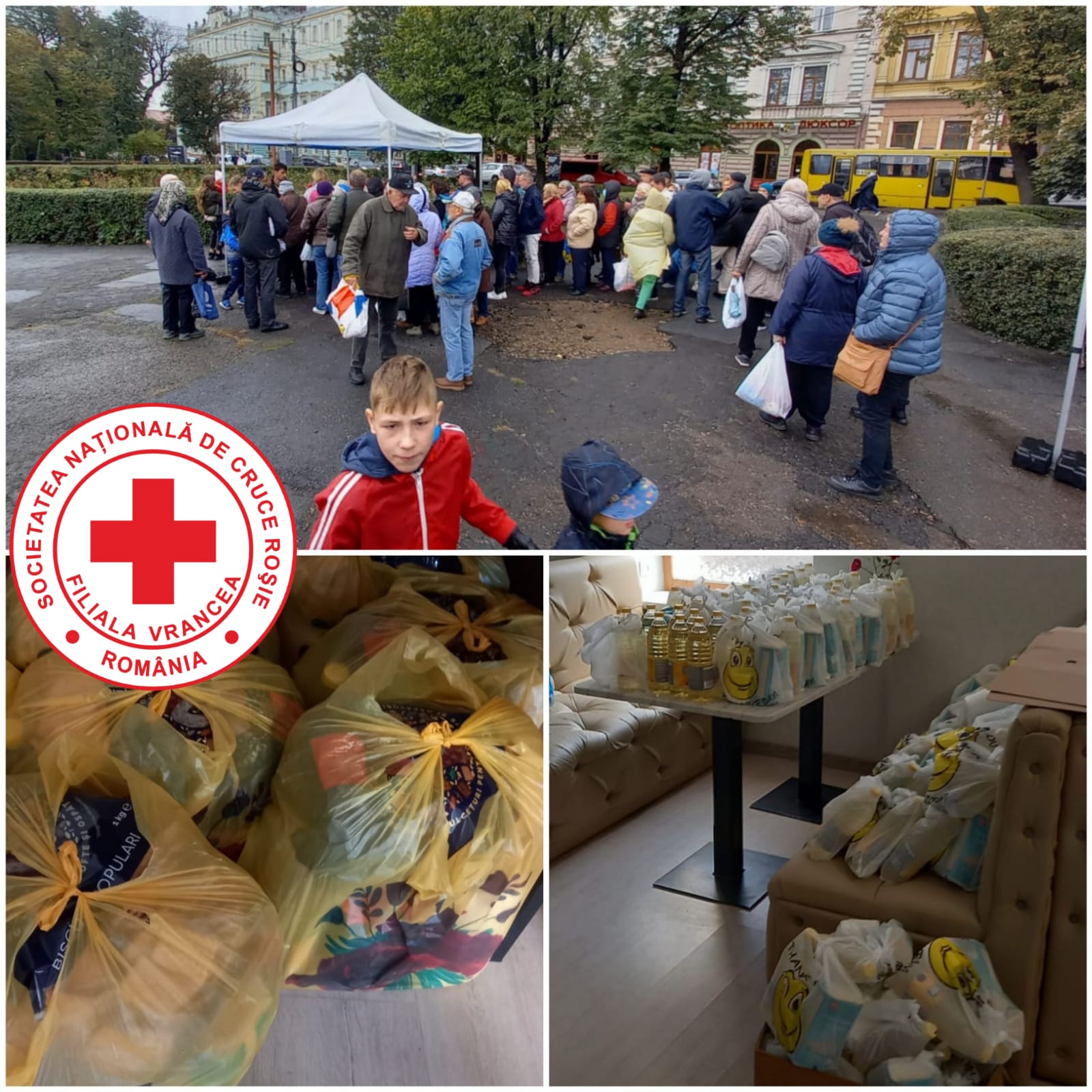
Logistical coordination carried out in risk situations by the Vrancea Red Cross
At the beginning of the war, only Rodica Davidean, Director of the Vrancea Red Cross, accompanied the aid shipments. Gradually, other employees and volunteers of the organization started joining in. They are the people behind the numbers who grind away daily trying to make sure the people left behind in Ukraine receive hot meals, personal hygiene products, water, other basic foodstuffs and survival kits (water filter, water container, water purification tablets, cooker with pot, paraffin, safety matches, phone charging generators, portable radios, mini solar panels, flashlights, emergency medical kit, children drinks, rope, etc.). They are “the people who, not knowing where and for whom they do this great good, are making it happen, giving it with a lot of feeling“, not showing any signs of being tired or any intentions of giving up, says Rodica Davidean.
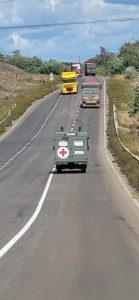
They help because someone has to, as Andrei puts it, a 51-year-old Ukrainian who joined them as a volunteer driver. His two sons and his wife are still in Ukraine, and with them in his thoughts he travels through dangerous areas like Odesa and Mykolaiv, sirens blaring all around him.
Determined to help, Ilie, aged 30, from Cernăuți, has joined them as an interpreter and talks daily during transports with people who have lost hope, who cannot see any end of the fighting and all they dream of is leaving the shelters to return to their homes.
During their travels they meet soldiers’ wives and children, but also children who no longer have parents, elderly people who have no one left or women who have joined the army, Olimpia tells us. Some were left homeless for a second time: first in 2014 following missile strikes, and after rebuilding their homes they were destroyed again.
“It’s awe-inspiring, we don’t know what war means. We have our own people in need here, but it’s two totally different things helping someone in peacetime and helping someone in wartime.“
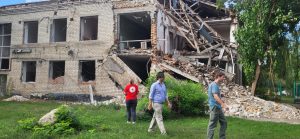
Bashtanka, Novoiehorivka and Lotskyne, Mykolaiv region, located close to the Kherson front line, are places where locals manage to smile when meeting volunteers. It is their hope for peace that gives drives us all.
Humanitarian convoys in Ukraine are unlike anything they have ever done before. “At any moment something bad can happen,” says Olimpia, a communicator with the Vrancea Red Cross. In July, when they got to Chortkiv, they learned that the town had been bombed shortly before their arrival. Sometimes, when they come to severely damaged cities like Chernihiv, Odesa or Kyiv, they learn that another strike is possible right then and there, and they are unable to prepare packages on the spot as they usually do.
“You come into town, unload and take off in the biggest hurry, you don’t know what you’re leaving behind.”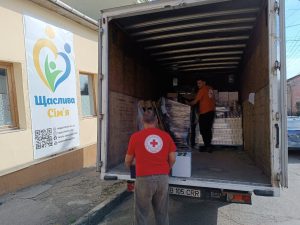
There is always a risk that food shipments will be seized by Russian soldiers, even if it has not happened to them so far. By late August they were supposed to set off to Ukraine with four trucks, but cancelled the plans when they received reports saying it was bad timing as the very areas they were expected to reach were in danger of being hit by missiles.
Often what volunteers have to do is new to them. Anca Heleanu, for example, has learnt on the go what shipment infrastructure entails:
“Acceptance of goods, acceptance of pallets, forklift, people available to perform the acceptance of goods, no matter what time it happens. Then the paperwork for the customs clearance, loading operations, goods count, prepare all the necessary paperwork, possibly in small vehicles, big vehicles, lease of vehicles, if necessary, then finding the manpower to deliver the shipments. It requires a great deal of attention and extraordinary resources.“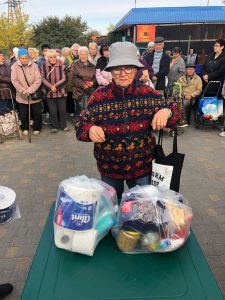
They say they never get tired. Sometimes I work a whole day, and at 5-6 am I start again. Their desire to be useful keeps them going, but so does the stark reality they witness on the ground: the number of people in need of assistance is growing constantly. “We believe, we simply believe,” says Rodica Davidean, “that what we do brings a change for the better. That is our inner drive.”
In November volunteers arrived in Kyiv bringing 25 tons of basic necessities for the displaced civilian population. They found a city with damaged energy infrastructure due to frequent bombings. For the same reasons hospitals were running without heat or water supply, making the mission of medical staff that much more challenging.
“However, the Ukrainian capital, though silent, cold and dark it may be, is alive with people who convey thoughts of PEACE in their looks and gestures,” the teams on the ground shared with us.
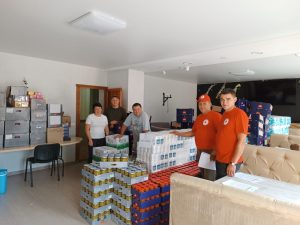 During this period, the Vrancea Red Cross has shipped and distributed hundreds of tons of humanitarian aid in Ukraine, helping over 35,000 people, with 60,000 kilometers traveled making it possible, through infrastructure and logistical coordination in risk situations, to deliver humanitarian intervention under CARE for Ukraine project.
During this period, the Vrancea Red Cross has shipped and distributed hundreds of tons of humanitarian aid in Ukraine, helping over 35,000 people, with 60,000 kilometers traveled making it possible, through infrastructure and logistical coordination in risk situations, to deliver humanitarian intervention under CARE for Ukraine project.
